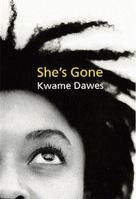
Dawes
Title: She's Gone
Author: Kwame Dawes
Publisher: MacMillan Caribbean
Reviewed by: Mel Cooke
IN THE Jamaican context 'gone' is one of those words loaded with multiple meanings. Some of them are the same as anywhere else, among them 'departed' and 'dead' (which, of course, are themselves used interchangeably). But then there are two ways in which 'gone', muttered in the Jamaican tongue, takes on special meaning.
One refers to the headspace. When a Jamaican says "dat deh one gone" we know that even if all the screws are in place some loosening has taken place. And when a mother takes a sheepish daughter into her father's presence and blurts "she gone", well, that's when all hell breaks loose.
Returns to united states
In Kwame Dawes' novel, She's Gone, Keisha finds herself 'gone' in the last sense by Jamaican lead singer-sudden-boyfriend Kofi at the point where she cuts her losses in Jamaica and returns to the United States. There she feels the inexorable pull of abusive older lover Troy ("Love is soft. What I got her is hard," he tells her during their final encounter) and many will opine that a beautiful, intelligent woman who finds the pull of a 'Troy' nearly irresistible to be 'gone'. As in head gone. No good. ("Troy's one sin was that he beat her." Helluva sin.)
But that is the beauty of She's Gone, in which reggae is critical to bringing Kofi and Keisha together (She's Gone is on the BMW album 'Kaya') and which throbs throughout its 314 pages. But it does not overwhelm like a too-loud sound system past the Noise Abatement Act hour; nor does it fade into the background as a bunch of mento musicians in a busy hotel lobby. (And Dawes does 'Saw' his way to get in a couple dancehall references.)
So Keisha is a strong woman, but not in the impervious way that the rabid feminist would probably prefer, limping with old hurts. And while the pages are apportioned much more generously in her direction than Kofi's, she is not the loner who needs no one.
She's Gone traces the relationship between Kofi and Keisha from their meeting at a concert his band plays in South Carolina through his invitation for her to accompany him to Jamaica, where she finds that 'he's gone' (as in the screws), although it is treatable. And he has a history that she runs smack into, with the older, exotic Dorothy and the wizened Aunt Josephine, who has two entirely different attitudes to Keisha. (The former is, to say the least, unkind.) And when she returns to South Carolina and Kofi returns to himself and chases after her she leads him on a merry city-to-city follow-the-leader. But we know that, carrying the child she told him she had lost, she wants to be caught.
Skills and intricacy

In summary, it all sounds simple enough, but the detailed intricacy of the plot and Dawes' sheer writing skill make it anything but. In the opening paragraph Dawes makes the band's movement from one US state to another a graphic statement of transition.
"They came across the border like a band of bearded outlaws, eight reggae rockers in a black tour bus that smelled of chew stick, garlic, and marijuana, three months after starting a United States tour, three weeks away from going home to Kingston."
And for their first love-making encounter, Dawes delivers a four-page steamer and screamer that climaxes with:
"And he came with tears and uncontrollable moaning. He came with all the tears of the brilliant day: the water, the light. Then he latched onto something that seemed to make sense, something he had to say, again and again and again, as everything poured from him: "Don't leave me. Don't leave me. Don't leave me." She came too because he cried."
Heady stuff indeed (and the Rastaman does give some head in the early going).
Transforming kofi
Dawes puts some of himself into the Kofi character (they are both born in Ghana and came to Jamaica in their childhood) and in situating Keisha in South Carolina, where he actually teaches, Dawes has Kofi trace his own journey when he is hot on Keisha's trail. And he makes it part of a larger journey, as Kofi tells Keisha how slaves were taken from Jamaica to plant rice in South Carolina.
She's Gone is a human tale, with all the attendant foibles, much like a song that is never the same live as it was recorded in the studio. It may be better, it may be worse. In this case it is better.

